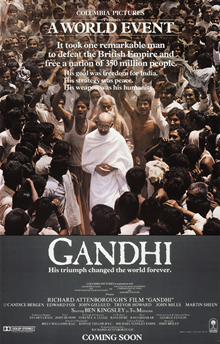 |
| Source: Wikipedia |
Naturally, the hero's life story begins with his underwhelming assassination, then the overwhelming funeral possession. How did one small, bald, brown man garner so much love?
Well, he starts as an unremarkable attorney in South Africa. As he practices law to feed his wife and children--things that don't make people famous--he fights for the rights of Indians. He pursues this ambiguous goal by appealing to an ambiguous nondenominational God, preaching and practicing nonviolence, and flouting British imperialism. What's the best place to fight for Indian rights? India. How do you reach the Indians? Look like one.
Unfortunately, India's enormous. A tiny pack of wannabe independents can't represent the whole of the nation, let alone unite it. (Even though, by saying so, Mr. Gandhi does so.) The "half-naked whatever-he-is" attains mythic status in his own lifetime. But his opponents (and their guns) are less keen on his nonviolent stance.
It's an inspiring journey, albeit rife with setbacks. Multiple arrests, mob violence, outright massacres. And the Mahatma reacts to horrible news with solemn dignity. Counter-intuitively, Gandhi retaliates with hunger strikes, or a call to starve the colonial economy by weaving your own cloth or making your own salt from the sea. Amazingly, when the man threatens self-harm, all of India just freezes, begging him to stop.
Does nonviolence work? The riot mobs would disagree. So would the freshly forged state of Pakistan, and the looming World War, and a certain disgruntled gunman from the prologue. But everybody adored the man Gandhi, even if they ignored every word he said.
188 minutes.
No comments:
Post a Comment